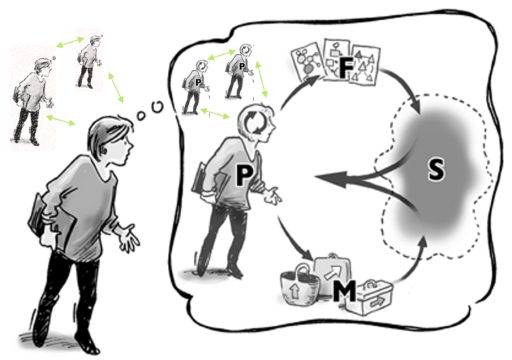Reflexive monitoring
Reflexive monitoring is one of the key principles of AgriLink’s Living Labs. It combines the concepts of reflexivity and monitoring. Reflexivity is a ‘second order’ process in which the observer sees her/himself as a part of the situation rather than apart from it (Ison, 2010; Fook, 2002). A reflexive process is one of critical self-awareness and thinking about thinking.
Figure 6.1 shows the main idea of reflexivity. When applied to the Living Labs, ‘practitioners’ might be researchers and other participants engaged in a critically reflective process about what they are doing and their underlying assumptions. Living Lab monitors had a key role in the reflexive monitoring of our Living Labs.
Equally, we have been clear about the framework of ideas we have used, as well as the methods and tools employed. Regular reporting on monitoring and evaluation provided opportunities and a structure for thus reflexivity.

You will recall from Session 2 that the aim in the development of new innovation support services is to better connect research and farmer-based innovations, while appreciating the diversity of farmers’ micro-AKIS. Achieving this requires a reflexive stance on the side of both researchers and practitioners, to critically look at their own practices, their views and their ways of doing things.
The Living Labs drew upon action research traditions that include reflexive monitoring as an integral part of their process, in particular the approaches of Reflexive Monitoring in Action developed at Wageningen University and Systemic Inquiry developed at The Open University (see Box 7.1 below). Both these approaches draw on a range of other traditions of theory and practice and both are framed as learning approaches to change.
Box 7.1 Reflexive Monitoring in Action and Systemic Inquiry
Reflexive Monitoring in Action (RMA) is an interactive methodology to encourage reflection and learning within groups of diverse actors that seek to contribute to system change in order to deal with complex problems. This approach builds on the assumption that recurrent collective reflection on a current system of interest (barriers as well as opportunities) helps to stimulate collective learning and to design and adapt targeted systemic interventions (Van Mierlo et al., 2010).
Systemic inquiry (SI) is a key form of practice for situations that are best understood as interdependent, complex, uncertain and possibly conflictual. Reflexive monitoring is an integral part of SI, as is facilitation. Doing systemic inquiry with others is a particular means of facilitating movement towards social learning, which is the sort of ‘concerted’ action associated with everyone working well together to address an issue of concern, making their contributions in a harmonious way.
The overall inquiry (system) is monitored, measures of performance articulated against acceptable criteria and control action taken. Measures of performance are not imposed from the outside. Iteration and concurrent action in different stages are common (Ison, 2010).
Session 6 The monitoring and evaluation of Living Labs
